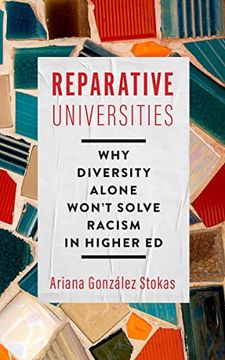Compartir
Reparative Universities: Why Diversity Alone Won't Solve Racism in Higher Ed (en Inglés)
Ariana González Stokas
(Autor)
·
Johns Hopkins University Press
· Tapa Dura
Reparative Universities: Why Diversity Alone Won't Solve Racism in Higher Ed (en Inglés) - González Stokas, Ariana
$ 86.091
$ 90.622
Ahorras: $ 4.531
Elige la lista en la que quieres agregar tu producto o crea una nueva lista
✓ Producto agregado correctamente a la lista de deseos.
Ir a Mis Listas
Origen: Estados Unidos
(Costos de importación incluídos en el precio)
Se enviará desde nuestra bodega entre el
Jueves 11 de Julio y el
Lunes 22 de Julio.
Lo recibirás en cualquier lugar de Argentina entre 1 y 3 días hábiles luego del envío.
Reseña del libro "Reparative Universities: Why Diversity Alone Won't Solve Racism in Higher Ed (en Inglés)"
A timely investigation of why diversity alone is insufficient in higher education and how universities can use reparative actions to become anti-racist institutions.As institutions increasingly reckon with histories entangled with slavery and Indigenous dispossession, diversity, equity, and inclusion (DEI) efforts occupy a central role in the strategy and resources of higher education. Yet reparation is rarely offered as a viable strategy for institutional transformation. In Reparative Universities, Ariana González Stokas undertakes a critical and decolonial analysis of DEI work, linking contemporary practices of diversity to longer colonial histories. González Stokas argues that diversity is an insufficient concept for efforts concerned with anti-oppression, anti-racism, equity, and decolonization. Given its historical ties to colonialism, can higher education foster reconciliation and healing?Reparation is offered as a pathway toward untangling higher education from its colonial roots. González Stokas develops the term "epistemic reparation" to describe a mode of social-historical accountability that can already be seen at work in historical examples, as well as current events in the United States, South Africa, and Canada. Recent legal decisions by Georgetown University and the Princeton Theological seminary to enact economic recompense for buying and selling human beings are evidence of attempts to redress higher education's violent histories and the colonial structures they reproduce every day on college campuses. Engaging with a broad range of theories from decolonial philosophy to organizational psychology, González Stokas offers a pathway--guided by reparative activities--for institutional workers frustrated by what often feels, as Sara Ahmed describes, like "banging one's head against a brick wall." Reparative Universities offers insight into why DEI efforts have been disconnected from past injustices and why unsettling diversity and engaging meaningful repair are critical for the future of higher education.
- 0% (0)
- 0% (0)
- 0% (0)
- 0% (0)
- 0% (0)
Todos los libros de nuestro catálogo son Originales.
El libro está escrito en Inglés.
La encuadernación de esta edición es Tapa Dura.
✓ Producto agregado correctamente al carro, Ir a Pagar.

